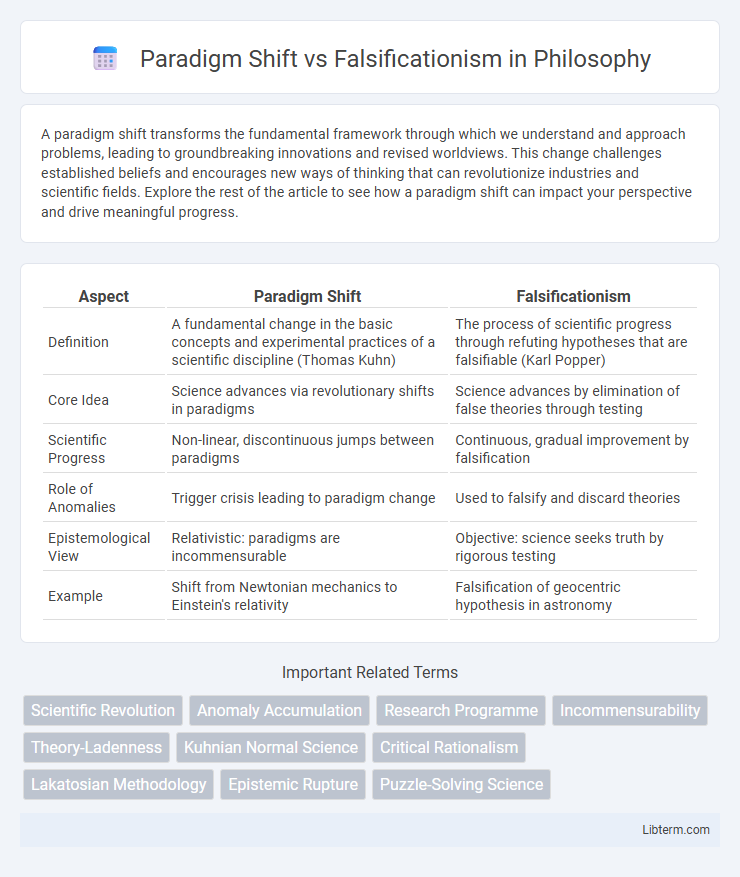A paradigm shift transforms the fundamental framework through which we understand and approach problems, leading to groundbreaking innovations and revised worldviews. This change challenges established beliefs and encourages new ways of thinking that can revolutionize industries and scientific fields. Explore the rest of the article to see how a paradigm shift can impact your perspective and drive meaningful progress.
Table of Comparison
| Aspect | Paradigm Shift | Falsificationism |
|---|---|---|
| Definition | A fundamental change in the basic concepts and experimental practices of a scientific discipline (Thomas Kuhn) | The process of scientific progress through refuting hypotheses that are falsifiable (Karl Popper) |
| Core Idea | Science advances via revolutionary shifts in paradigms | Science advances by elimination of false theories through testing |
| Scientific Progress | Non-linear, discontinuous jumps between paradigms | Continuous, gradual improvement by falsification |
| Role of Anomalies | Trigger crisis leading to paradigm change | Used to falsify and discard theories |
| Epistemological View | Relativistic: paradigms are incommensurable | Objective: science seeks truth by rigorous testing |
| Example | Shift from Newtonian mechanics to Einstein's relativity | Falsification of geocentric hypothesis in astronomy |
Understanding Paradigm Shift: Kuhn’s Revolutionary Science
Kuhn's concept of a paradigm shift revolutionizes the understanding of scientific progress by emphasizing the role of dominant frameworks in shaping normal science until anomalies accumulate and trigger a crisis. Unlike falsificationism, which promotes science as a linear process of hypothesis testing and rejection, paradigm shifts highlight episodic, transformative changes that redefine scientific standards and methodologies. This model underscores the complex, non-linear evolution of scientific knowledge driven by collective consensus and revolutionary breakthroughs.
The Essence of Falsificationism: Popper’s Philosophy of Science
Karl Popper's falsificationism centers on the principle that scientific theories must be inherently testable and refutable through empirical evidence to be considered scientific. This philosophy rejects the notion of absolute verification, emphasizing instead that scientific progress occurs by systematically eliminating false hypotheses. Popper's approach contrasts with paradigm shifts by prioritizing continuous critical testing over revolutionary changes in scientific frameworks.
Key Differences between Paradigm Shift and Falsificationism
Paradigm shift, introduced by Thomas Kuhn, emphasizes scientific progress through revolutionary changes in underlying frameworks, whereas falsificationism, proposed by Karl Popper, focuses on refuting hypotheses through empirical testing. Paradigm shifts involve a wholesale change in scientific consensus and methodologies, while falsificationism prioritizes continuous hypothesis testing to eliminate false theories. Key differences revolve around the nature of scientific advancement: paradigm shifts signify incommensurable changes in worldview, whereas falsificationism upholds incremental progress via critical scrutiny.
Historical Roots and Development of Both Concepts
Paradigm shift, introduced by Thomas Kuhn in "The Structure of Scientific Revolutions" (1962), challenges the traditional view of science as a linear progression by highlighting the role of radical changes in scientific frameworks through revolutionary shifts. Falsificationism, developed by Karl Popper in the 1930s, emphasizes the criterion of falsifiability as a demarcation of scientific theories, focusing on their ability to be empirically tested and potentially refuted. Both concepts emerged as critical responses to logical positivism, shaping the philosophy of science by addressing the dynamics of scientific change and theory evaluation.
The Role of Anomalies in Scientific Progress
Anomalies play a crucial role in both paradigm shifts and falsificationism in scientific progress, serving as evidence that challenges existing theories. In paradigm shifts, proposed by Thomas Kuhn, anomalies accumulate until they undermine the prevailing paradigm, triggering a revolutionary change in scientific understanding. Falsificationism, advocated by Karl Popper, views anomalies as opportunities to rigorously test and potentially falsify hypotheses, thus driving the evolution of scientific knowledge through critical scrutiny.
Normal Science vs Scientific Revolution
Normal science, as described in Paradigm Shift theory, involves puzzle-solving within an established framework, where anomalies are often ignored or set aside. Falsificationism emphasizes the critical testing and potential refutation of hypotheses to advance science. Scientific revolutions occur in Paradigm Shift theory when persistent anomalies undermine the existing paradigm, leading to its replacement, while falsificationism sees progress as a continuous process of conjectures and refutations without distinct revolutionary breaks.
Criticisms and Limitations of Paradigm Shift
Paradigm shift theory, proposed by Thomas Kuhn, faces criticism for its ambiguity in defining what constitutes a paradigm and for the subjective nature of scientific progress it implies. Critics argue that paradigm shifts are not as discontinuous and revolutionary as Kuhn suggests, often overlooking incremental advancements within established frameworks. The theory also struggles to account for the role of falsifiability, a cornerstone in Karl Popper's falsificationism, which emphasizes empirical testing and refutation as essential to scientific progress.
Criticisms and Challenges to Falsificationism
Falsificationism faces criticism for its rigid criterion that scientific theories must be falsifiable, as some important scientific theories are not easily testable or falsifiable at early stages. Philosophers argue that falsificationism overlooks the complexity of scientific practice, including theory-laden observations and the role of background knowledge, which can protect theories from straightforward refutation. Challenges also arise from the Duhem-Quine thesis, highlighting that experimental results test whole theoretical networks rather than isolated hypotheses, complicating the process of falsification.
Impact on Modern Scientific Methodology
Paradigm shift, introduced by Thomas Kuhn, emphasizes revolutionary changes in scientific frameworks altering research approaches and problem-solving strategies. Falsificationism, proposed by Karl Popper, prioritizes hypothesis testing and the systematic rejection of false theories to advance scientific knowledge. Both concepts have shaped modern scientific methodology by balancing groundbreaking innovation with rigorous, empirical scrutiny.
Paradigm Shift and Falsificationism: Which Drives Scientific Change?
Paradigm shift, a concept introduced by Thomas Kuhn, emphasizes revolutionary changes in scientific frameworks that redefine research directions and methodologies. Falsificationism, proposed by Karl Popper, argues that scientific progress occurs through the rigorous testing and refutation of hypotheses. The debate centers on whether science advances primarily by accumulating anomalies leading to paradigm shifts or through systematic falsification of theories.
Paradigm Shift Infographic

 libterm.com
libterm.com